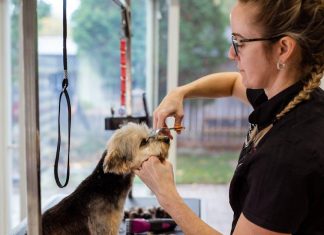Welcoming a new puppy into your home is an exciting and joyful experience, filled with moments of play, discovery, and boundless affection. As a loving pet owner, you naturally want to ensure that your furry friend grows up healthy and happy. This guide is designed to help you navigate the essentials of improving your puppy’s overall health, offering practical tips and heartfelt advice to support their well-being from the very start. From nutrition and exercise to mental stimulation and regular veterinary care, we’ll explore the key components that contribute to a thriving puppy. Let’s embark on this journey together, laying a strong foundation for a lifetime of wellness and companionship.
Nutrition Tips for a Happy and Healthy Puppy
Ensuring your puppy receives the right nutrients is essential for their growth, energy, and overall happiness. Puppies require a diet rich in proteins, healthy fats, vitamins, and minerals to support their developing bodies and active lifestyle. Here are some key tips to keep your furry friend thriving:
- Choose High-Quality Food: Opt for premium puppy food that lists meat as the first ingredient. This ensures a high protein content, crucial for muscle development.
- Balance is Key: Include a mix of proteins, fats, and carbohydrates. Healthy fats like omega-3 and omega-6 are vital for a shiny coat and brain development.
- Monitor Portion Sizes: Overfeeding can lead to obesity, while underfeeding can hinder growth. Follow the feeding guidelines on the food packaging and adjust as needed based on your puppy’s activity level and body condition.
In addition to a balanced diet, hydration plays a critical role in maintaining your puppy’s health. Always provide fresh, clean water, and encourage your pup to drink regularly, especially after playtime or walks. A well-nourished and hydrated puppy is more likely to grow into a strong, energetic, and joyful adult dog.
 Exercise and Playtime: Building Strong Bodies and Minds”>
Exercise and Playtime: Building Strong Bodies and Minds”>
Exercise and Playtime: Building Strong Bodies and Minds
Incorporating regular exercise and playtime into your puppy’s routine is crucial for their physical and mental development. Puppies are bundles of energy, and channeling that energy into productive activities helps them grow into well-rounded adult dogs. Here are some activities to consider:
- Interactive Games: Engage your puppy with games like fetch or tug-of-war. These activities not only help in building muscle strength but also enhance their problem-solving skills.
- Agility Training: Set up a simple obstacle course in your backyard. Use cones, tunnels, or low jumps to teach your puppy coordination and improve their balance.
- Social Play: Arrange playdates with other puppies. This not only provides physical exercise but also teaches them valuable social skills.
Incorporating mental exercises is just as important as physical ones. Use puzzle toys or hide treats around the house to stimulate their minds and keep them engaged. A well-exercised puppy is a happy puppy, leading to a harmonious household.
 Regular Vet Visits: The Key to Preventive Puppy Care”>
Regular Vet Visits: The Key to Preventive Puppy Care”>
Regular Vet Visits: The Key to Preventive Puppy Care
Ensuring your puppy grows into a healthy and happy dog requires more than just love and affection. One of the most effective ways to support their well-being is through consistent vet check-ups. These visits are not just for when your furry friend is feeling under the weather, but are an essential component of preventive care.
During these appointments, your vet can perform a thorough health examination, identifying any potential issues before they become serious. This proactive approach can save your puppy from discomfort and save you from unexpected vet bills. Regular check-ups often include:
- Vaccinations: Keeping your puppy’s vaccinations up to date is crucial in protecting them from contagious diseases.
- Parasite Prevention: Your vet will check for signs of parasites and recommend treatments to keep them at bay.
- Nutritional Advice: Discussing your puppy’s diet can ensure they receive all the necessary nutrients for growth.
- Behavioral Tips: Early intervention can address any behavioral issues, making training easier and more effective.
By establishing a routine of regular vet visits, you’re not just safeguarding your puppy’s health; you’re also fostering a relationship with a trusted veterinary professional who can provide guidance and support throughout your puppy’s life. Embrace this opportunity to learn and grow together, ensuring your puppy’s journey is a joyful and healthy one.
















